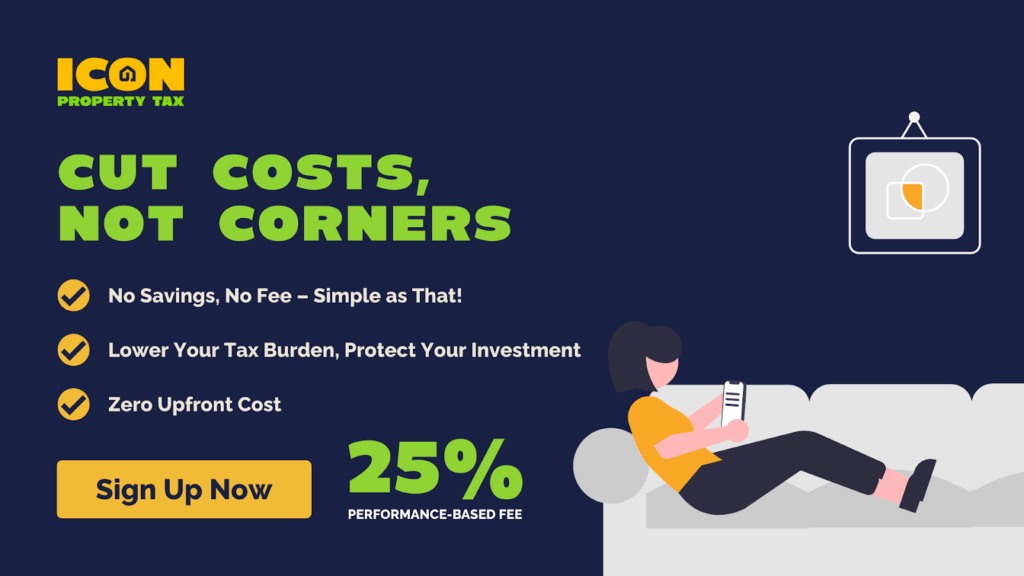A Homeowner’s Guide: When Are Cook County Property Taxes Due Each Year?
October 10, 2025
Key Takeaways:
- Billing Structure: Cook County uses a two-installment property tax system, with the first bill estimated and the second based on final assessments.
- Due Date Variability: The second installment deadline changes year to year depending on when local tax rates and exemptions are finalized.
- Homeowner Tools: Property owners can check their tax bills and assessment insights online through the Treasurer’s site or via Icon Property Tax.
Understanding when property taxes are due in Cook County can feel confusing, especially if you’re new to homeownership or unfamiliar with the county’s unusual billing cycle. With two installments, shifting deadlines, and different rules from most other Illinois counties, it’s easy to overlook important dates or pay more than necessary. Staying on top of this schedule is essential not only to avoid late fees, but also to protect your wallet from potentially inflated tax bills. Knowing what to expect each year can help you stay prepared and avoid unnecessary stress during tax season.
At Icon Property Tax, we’ve helped Cook County homeowners save over $100 million in property taxes by providing data-driven appeals and trusted local expertise. We’re proud to offer a fully transparent, no upfront cost service that only charges when we help you lower your bill. Backed by over 30 years of combined experience, our agents know the ins and outs of the local property tax system and are ready to stand up for your right to a fair assessment.
Understanding Cook County Property Tax Due Dates
Property taxes in Cook County don’t follow the same schedule as other counties in Illinois, and that can cause confusion for many homeowners. Unlike most counties that send bills out in the spring with two predictable due dates, Cook County operates on a delayed billing system.
Cook County property taxes are billed in two installments each year. The first installment is generally due on March 1 and is based on 55% of the previous year’s total tax bill. The second installment is where the final tax amount is calculated based on the current year’s assessed value and applicable exemptions. This second bill tends to be issued and due later in the year, and its timing can vary.
Because the second installment depends on multiple moving parts , assessment appeals, exemption applications, and budgeting timelines , it’s often delayed, and deadlines can shift from year to year.
This unpredictability makes it easy to miss deadlines or feel caught off guard. That’s why it’s important for Cook County homeowners to stay informed and proactive about their property tax responsibilities.

Why Property Tax Bills Are Split Into Two Installments
Understanding why Cook County splits property tax bills into two payments helps clarify what you’re being charged and when. This system isn’t just administrative; it’s built around the county’s unique assessment and budgeting timeline. Here’s how it works and why it matters:
The First Installment: A Fixed Estimate
The first installment is based on 55 percent of the previous year’s total tax bill. It does not reflect the current year’s assessed value or any exemptions you may now qualify for. This estimated amount is typically due by March 1 each year.
The Second Installment: The Final Balance
The second installment reflects the actual tax owed for the current year. It takes into account updated assessments, approved exemptions, and the current tax rates set by local taxing bodies. Once those factors are finalized, the amount paid in the first installment is subtracted to determine the remaining balance due.
Why This System Exists
Splitting the bill into two parts gives Cook County time to process appeals, apply exemptions, and finalize budgets. While this adds a layer of flexibility for both the county and taxpayers, it also means deadlines for the second bill are less predictable. Staying informed is essential to avoid missed payments or late penalties.
How To Access Your Cook County Property Tax Bill Online
Staying on top of your property tax bills starts with knowing where to find them. Thankfully, Cook County makes it easy for homeowners to view their property tax details through an online portal. If you’re unsure about what you owe or when your payment is due, here’s how you can check:
Step 1: Visit The Cook County Treasurer’s Website
Go to the official Cook County Treasurer’s Office website. This is the most reliable source for accessing your property tax bill, payment history, and upcoming due dates.
Step 2: Search Using Your Property Index Number (PIN)
To find your property, you’ll need your Property Index Number (PIN), which is a unique 14-digit number assigned to every property in Cook County. You can find this on a previous tax bill, mortgage statement, or by using the search tools on the Treasurer’s site.
Step 3: View And Download Your Bill
Once you’ve entered your PIN, you’ll be able to see a detailed breakdown of your tax bill, including installment amounts, payment status, and due dates. You can also download a PDF version for your records.
Bonus: Get Deeper Insights With Icon Property Tax
If you want more than just the bill , such as insights into your property’s assessed value and whether you’re potentially being overtaxed, you can also look up your property on Icon’s website. Our platform gives you easy access to key details that can help you decide if an appeal makes sense.
When Are Cook County Property Taxes Typically Due Each Year?
Cook County property tax due dates follow a general pattern, but they don’t always land on the same calendar day every year. While most counties across Illinois stick to consistent billing timelines, Cook County’s unique tax structure means homeowners need to pay closer attention to changes in the schedule.
First Installment: Usually Due March 1
The first installment of your property tax bill is typically due on March 1. This payment is calculated as 55 percent of your prior year’s total tax bill, regardless of your current property value or exemptions. Even if you plan to appeal your assessed value, this installment must still be paid on time.
Second Installment: Dates Vary From Year To Year
The second installment is where things get more uncertain. Because it relies on finalized assessments, local tax rates, and exemption updates, it’s often delayed. Some years it may be due in late summer, other years it can be pushed into the fall or even later.
In recent years, Cook County has seen second installment deadlines pushed as far back as December, which can create confusion for homeowners who expect more consistency. That’s why it’s important to check the Treasurer’s website or keep an eye on your property details through Icon Property Tax for updates.
Why Staying Informed Matters
If you miss a due date, even by a day, penalties and interest begin to accrue. The unpredictability of Cook County’s second installment timeline is one of the reasons so many homeowners overpay or miss opportunities to appeal. Having a trusted resource can make a big difference in avoiding unnecessary costs.

What Happens If You Miss The Due Date?
Missing a property tax deadline in Cook County can quickly lead to financial consequences. While the county does offer some flexibility in its billing schedule, there are strict rules in place once a due date has passed. Homeowners should understand the risks of late payments to avoid unnecessary penalties and complications.
Late Fees And Interest Charges Add Up Quickly
If you miss a property tax due date, Cook County begins applying interest at a rate of 1.5 percent per month on the unpaid balance. This interest is compounded monthly, meaning the longer you delay payment, the more it costs you. Even a short delay can make a noticeable difference in what you owe.
Risk Of Tax Sale For Long-Term Delinquency
If your taxes go unpaid for an extended period, your property could be included in the Annual Tax Sale. This is a legal process where delinquent taxes are sold to investors, who then have the right to collect the debt plus interest. Redeeming your property after a tax sale can be expensive and legally complex.
Avoiding Missed Payments
Staying ahead of deadlines is the best way to protect your property and your wallet. Make it a habit to check your property tax status online and keep a record of due dates. You can also look up your address on the Icon Property Tax platform to track updates and better understand your tax situation.
How Icon Property Tax Helps Homeowners In Cook County
Property taxes in Cook County can be confusing, unpredictable, and sometimes higher than they should be. Many homeowners are unaware that they may be overpaying, especially if their property assessments are inaccurate or if exemptions are overlooked. This is where Icon Property Tax steps in to advocate for you and help reduce your tax burden through a smart, tailored appeal process.
We Handle The Appeal, So You Don’t Have To
Navigating the property tax appeal process can be overwhelming, but you don’t have to do it alone. Icon Property Tax brings over 30 years of combined experience and trusted local expertise to help you challenge unfair assessments. Our agents manage everything from data analysis to filing and follow-up, making the process stress-free for homeowners.
Only Pay When You Save
With Icon, there are no upfront fees. Our performance-based model means you only pay 25 percent of the savings we help you achieve. If we don’t win your appeal, you don’t owe us a thing.
Trusted By Homeowners Across Cook County
We’ve helped clients save over $100 million in property taxes. Whether your home is in Chicago or a surrounding suburb, our local agents understand the unique rules and market factors in each area. That knowledge translates to a stronger case when appealing your assessment.
Start By Looking Up Your Property
The first step is simple. Search your address on IconPropertyTax.com to access property insights and see if you might be overpaying. From there, we’ll let you know if an appeal is worth pursuing.

Final Thoughts
Staying informed about Cook County’s property tax due dates is more than just responsible, it can save you money. With a two-installment system, changing deadlines, and the risk of penalties, homeowners need to be proactive about monitoring their tax bills and understanding their assessments.
If you think your property taxes are too high, or if you’re unsure whether your assessment is accurate, you’re not alone. Many Cook County homeowners overpay simply because they don’t realize an appeal is an option. That’s where Icon Property Tax steps in to work on your behalf.
We bring deep local expertise, a performance-based pricing model, and a track record of saving our clients money. With zero upfront costs, there’s no reason not to take a closer look at your bill.
Start by checking your property details today. Visit IconPropertyTax.com to search your address and discover valuable insights about your property taxes. If there’s an opportunity to appeal, we’ll fight for your right to a fair assessment.
Read Also:
- Grayson County Property Tax Guidance For Local Homeowners
- Rockwall County Property Taxes: What Homeowners Need to Know
- Texas Approves Major Property Tax Relief Plan For Homeowners And Businesses
Frequently Asked Questions About Cook County Property Taxes Due Each Year
Do Cook County property taxes increase every year?
Not always. Increases depend on changes in assessed value, local government budgets, and whether new referendums or levies are approved by voters.
Can I prepay my Cook County property taxes?
No. Cook County does not allow prepayment of property taxes. Homeowners must wait until each installment bill is issued before making a payment.
Is there a way to set up automatic payments for Cook County property taxes?
Yes. The Cook County Treasurer’s Office offers an online system where you can schedule payments, including recurring payment options through your bank account.
Does paying property taxes early offer a discount in Cook County?
No. Unlike some counties, Cook County does not provide discounts for early payment. You must pay by the due date to avoid interest or penalties.
Who receives the money from Cook County property taxes?
Your payments go toward funding local services, including public schools, libraries, fire departments, police, and municipal operations.
What if I never receive my property tax bill in the mail?
You are still responsible for paying on time. You can view and download your bill from the Cook County Treasurer’s website even if you never received a paper copy.
Can renters be affected by changes in Cook County property tax rates?
Indirectly, yes. If a landlord’s property taxes go up, they may raise rent to cover the additional cost. Renters should stay informed about local tax trends.
What is the Cook County PIN and why is it important?
Your Property Index Number (PIN) identifies your specific property in the tax system. It’s required for checking your bill, making payments, and filing appeals.
Are property taxes in Cook County deductible on my federal tax return?
Yes, up to the IRS limit for state and local tax (SALT) deductions. However, the total deduction allowed is capped and may vary by your filing status.
How can I keep track of changes to my property’s assessed value?
You can sign up for email alerts through the Cook County Assessor’s Office or look up your property on IconPropertyTax.com to monitor assessments and appeal opportunities.

